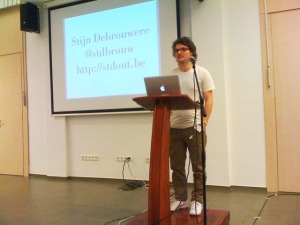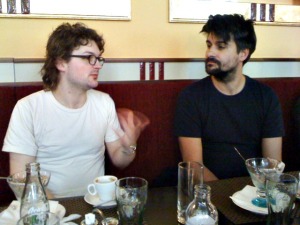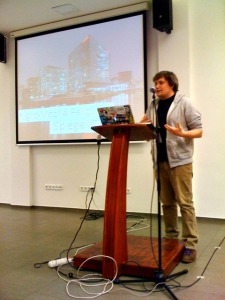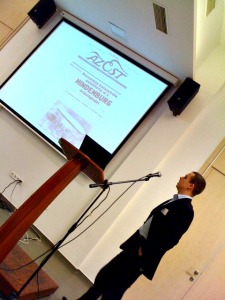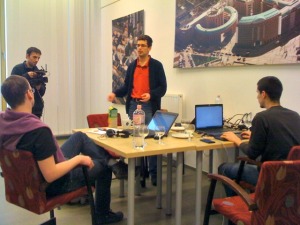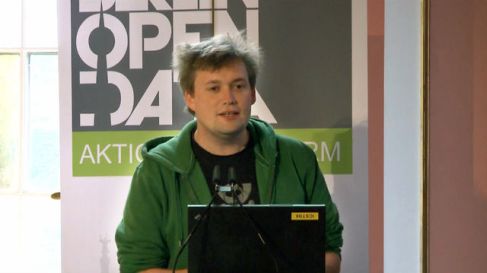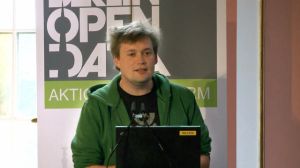The first Hungarian data journalism and hackday was organized by the Hungarian pop-sci portal Language and Science (Nyelv és Tudomány www.nyest.hu) and the Budapest Natural Language Processing Meetup with the generous support of Knight-Mozilla OpenNews, Precognox and Language Experts on the 6th of April at the House of Hungarian Journalism. Our speakers were national and international experts: journalists, developers and hackers; almost all devoted fans of Open Data. They gave short lectures on the future of online journalism and their work in the field of open data. Here follows our summary of all the interesting and thought-provoking talks we heard.
Strange genres of the internet
In a way, Internet hasn’t really “revolutionized” journalism from the point of view of news organisations as independent news agencies, news portals do not accumulate as large revenues as in the time of classic print media. The first speaker, Stijn Debrouwere a Knight-Mozilla Fellow at The Guardian sketched the future of online journalism through a few interesting models of American news organizations. There’s a lot more happening in online media than one would think, but we don’t always recognize innovation as journalism. A good example is The Huffington Post’s interesting model in content-making: of course, the portal uses paid journalists, but also activists who write articles only because it’s good to be connected to the Huffington brand. Deseret Connect improved this model so that they offer a free course in writing for their volunteers. This means that they don’t have to pay their authors but still get quality content because their editors work with the authors throughout the publishing process.
Some readers have decided that they no longer need journalists to tell them what is important. Reddit has a forum called Ask Me Anything which revolutionized the genre of interview as it allows anyone to register as an interviewee and other users can ask them questions. That the question arises whether this is at all different from traditional interview? And if not, how will this affect professional press in the future? Or, on a different note, you cannot help but wonder whether you still need review columns when Netflix, Amazon, Spotify and some similar pages recommend us volumes of movies, books and programs we might like.
These are only a few innovations we should consider when thinking about the future of online journalism. According to Stijn the message is not that journalism is in danger, but that we have to expand our fantasy while thinking about what is the potential risks are. The question is: do we possess any information that the readers should know? How can we get it to them? This is what we have to find answers for.
To watch the speech on Ustream, click on this link.
Talking about the devil: paid content in online media
As mentioned earlier, online news organizations struggle with financial difficulties because their main source of income is advertising, and in many cases this income will surely not be sufficient to maintain a newsroom. And here came a big contrast: Paywall claims their solution may be The Solution to this problem. Dávid Puha, marketing specialist at Piano Media talked about the advantages of Paywall, a virtual wall that helps to wall off your paying content. Of course, claims Puha, it’s not easy to imagine that it is possible to keep 100% of your readers if you offer paid content instead of free goodies, there is a chance for a minimal “waste” if you combine the right content, sales-channels, marketing strategy and technology. There are a great number of objections to Paywall: studies and statistics show that most readers just do not tolerate paid content. For example, in 2011 The New York Times had a campaign supporting paid content. A University of British Columbia survey showed that 81% of online readers would not pay for online news at all. Bummer.
There are, however, news organizations that were able to successfully introduce Paywall-type of solutions on their site, Wall Street Journal for example has one million readers who pay for their content. The Times and The Sunday Times can be accessed online only for one pound. Various different models exist for paid content service, however it seems that for now it is only a possible solution for bigger papers.
To watch the speech on Ustream, click on this link.
Another aspect: data has to be free!
And then came the cavalry. „Open data is data that can be freely used, reused and redistributed by anyone – subject only, at most, to the requirement to attribute and sharealike.” This definition of open data can be found at the Open Knowledge Foundation’s website. OKF promotes open data and open content – an interesting and colourful contrast to the views of the previous speaker.
Michael Bauer of OKF chose the topic „why openness is a good idea for journalists”. He started with a proposition: think about how philosophers work! They use ideas of others, mix them, throw out what is unnecessary and create new ideas from what remains. Michael says online journalism should be like this: sharing source and content, so that readers and other journalists might reveal another interpretation of the story. For example, The Guardian has a data blog where they share visualizations of data and also their sources, so journalists can do their own leg-work and write the story from their own point of view. Also, OpenNews has a blog called Source Code where people working in the news business can share the code they created. Speaking about data journalism, it’s still not common for people to share their sources, but we are slowly and surely getting there.
To watch the speech on Ustream, click on this link.
Sentiment and social media
Péter Szekeres, lead researcher at Neticle Technologies, introduced their online opinion mining software through the example of how online media conceive Hungarian stocks and the BUX index. Their solution offers an index of opinion: they create this figure for the examined subject or person based on the general sentiment in the online networking sites, identify dramatic and less dramatic drops and try to determine opinion-setting actors or even comments, online events. The result is a number of picturesque graphs that can be published along your news item. Neticle analysed Hungarian online content in a 60-day long period and found that the web’s opinion about BUX-index illustrates punctually what has happened in stock exchange. Their results also show that people talk more about stocks when they trade more, and evidently, at weekends when there’s no trading, almost no one is talking about it online.
To watch the speech on Ustream, click on this link.
We heard two talks about investigative journalism and open data in Hungary
Sándor Léderer represented K-Monitor Watchdog for Public Funds, which was founded in 2007 with the aim of creating an independent non-governmental forum that keeps Hungarian and international corruption-related cases at issue. He introduced their new project which aims to set up the corruption map of Hungary. If you are interested in corruption cases, you may click on any area or town of Hungary, and are able to see all the corruption cases connected to them. Their main sources are articles (their database consists of 20.000 articles) and whistleblowing: anyone can send in a case they think is relevant. They also set up a tagging system, which makes it easier to find the case you are looking for. An on-going project is going to be a network aimed to show relations between companies, businessmen and politicians.
To watch the speech on Ustream, click on this link.
Ildikó Kovács a journalist of atlatszo.hu (átlátszó means transparent in Hungarian) a watchdog NGO based in Budapest, Hungary that combines investigative journalism and civic activism to promote transparency in Hungary. She shared her experiences in investigative journalism and demonstrated how relevant data can be gathered and visualized in Hungary. She also introduced MagyarLeaks and KiMitTud, sites that claim and leak data of general interest. Among others she also expressed that the main problem in Hungary is the availability of data from government sources.
To watch the speech on Ustream, click on this link.
Let’s go back to open source! Sourcefabric is one of the largest European source projects for news and media. They provide news organizations with open source software, expertise and support. Kristin Trethewey introduced Sourcefabric’s three projects that might help a lot for those who work in media. Airtime helps radios automatize their broadcast, with Booktype we can edit our own books until it becomes ready for printing, and Newscoop helps news organizations manage online publications, enrich content and find new audiences.
To watch the speech on Ustream, click on this link.
True stories matter, not politicians’ statements
Spiegel Online also has a Knight-Mozilla OpenNews Fellow in their newsroom. He is Friedrich Lindenberg a media scientist turned coder working on open government and transparency initiatives. In his speech he gave us ideas about understanding the European Union through data and he proposed to re-think how we cover government issues: what we do should preferably be data-driven. It might be an important step to develop story-engines that report automatically on events like baseball games, so journalists have time for more important matters. He introduced Parltrack, a European initiative that helps journalists interested in the EU: it collects and leaks documents from the European Parliament. According to Friedrich, the point is that we should report on actions, not words. Let’s search for databases, get the data we need and remember to turn it back into a story because that’s what readers expect, not Excel-charts.
To watch the speech on Ustream, click on this link.
Ákos Balogh chief editor at mandiner.hu also put in a word for online news sites. He stated that with the help of like- and recommend-buttons Facebook and other social media sites have more information about a news site’s readers than the editors. This makes the competition uneven because rivals can get more information with the help of paid advertisements on Facebook. Balogh recommends online news sites to attempt to officially claim their site-specific information in order to stay ahead of the events. He even proposed that Mandiner might start legal procedures to try to obtain all data the social networking site stores about their readers. Should this happen, we hope we will be able to tell you about it here.
To watch the speech on Ustream, click on this link.
We would like to thank Ustream for broadcasting inkLink live and also their representative, Dániel Kiss for his speech about the future of online streaming sites. He demonstrated how easy it is these days to stream important events with only a mobile phone in our pocket. To prove his point, he presented Tim Pool’s example, the journalist, who broadcast the Occupy Wall Street movement with his mobile phone for 21 hours, even though reporters were banned from the location. He won this year’s award for best social media journalist.
To watch the speech on Ustream, click on this link.
During the hack-day three volunteers were working on an open source program, which is able to invoke a big quantity of text and visualize their associative relations through the links included. It might help journalists to reveal connections between not only articles, but stories and events. The program will be openly available for everyone shortly, in the meantime let’s watch the whole event on inkLink’s stream!

